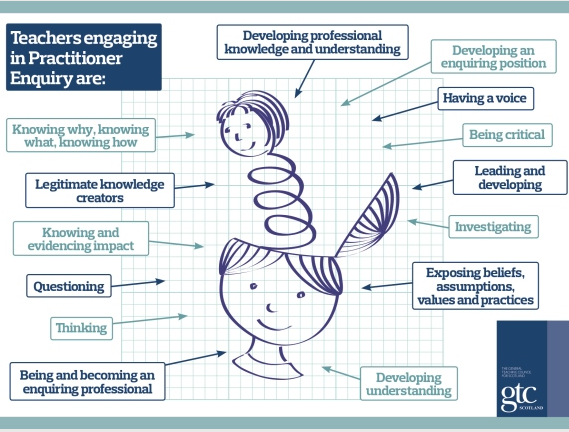Author: Lynne Jones, SCILT
A key feature of each of the GTCS Professional Standards, there is a lot of talk these days about practitioner enquiry as a means of professional learning. With this in mind, SCILT has diversified its CLPL provision and expanded its Leadership Development strand. As such, a team of four SCILT colleagues with enquiry experience are supporting three small-scale practitioner enquiry projects involving development officers and teachers across Scotland.
‘Reflective and enquiring teachers who are engaged in continuous improvement are developing the attitudes and habits of mind which are integral to leadership.’ (Teaching Scotland’s Future, Donaldson, 2011: 10)
Before the summer holidays, six colleagues with leadership responsibilities for languages at cluster or local authority level volunteered to participate in a pilot. The overarching aim of the pilot is to provide an evidence base for aspects of current practice in Scottish language classrooms. All three enquiry projects come under the umbrella of ‘Raising attainment for all’.
Colleagues from Perth & Kinross, Dundee, Dumfries & Galloway and East Ayrshire have decided to undertake a collaborative enquiry into primary-secondary transition. Meanwhile, colleagues in Aberdeenshire and South Lanarkshire have begun investigating effective teaching and learning of languages in multiple composite primary classes. Finally, an Additional Support for Learning (ASL) Outreach Teacher with Edinburgh City Council is investigating the impact on school refusers of the opportunity to learn Chinese in a non-school setting. The context of this particular enquiry was outlined at a seminar at the 2016 UK and Republic of Ireland Confucius Classroom Conference, which took place in Glasgow in September.
Contextualised and each with a very particular focus, the findings from these projects are likely to be of interest to a wide range of educators and linguists. The aim is to disseminate the findings and recommendations arising from each of the three projects widely in due course.
Image courtesy of General Teaching Council for Scotland

Return to December 2016 newsletter